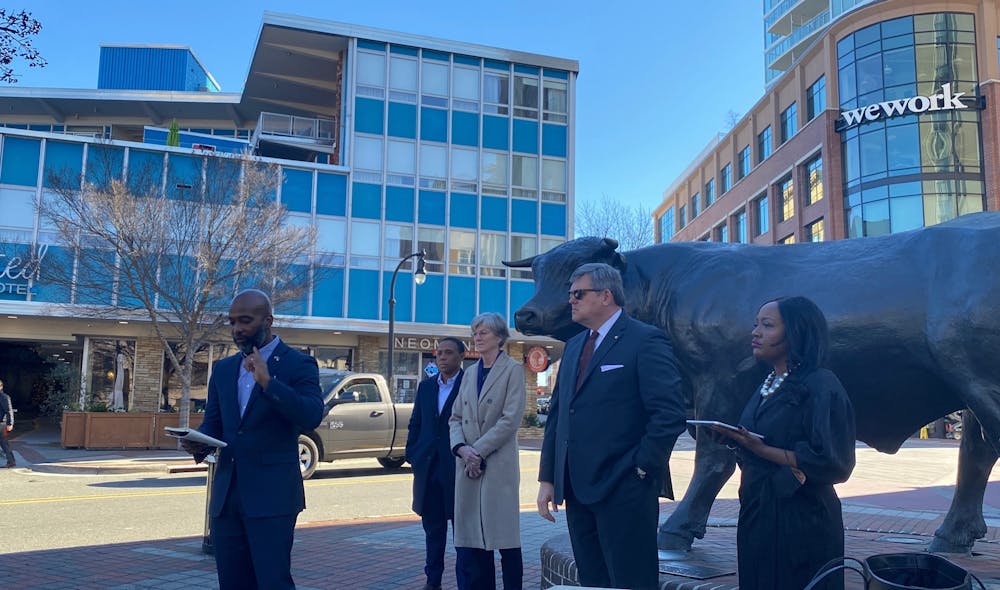The Durham delegation to the North Carolina General Assembly held a vigil at the CCB Plaza in downtown Durham Thursday in remembrance of the Jan. 6 attacks on the U.S. Capitol.
The delegation consists of state Reps. Vernetta Alston, Marcia Morey and Zack Hawkins and state Sens. Natalie Murdock and Mike Woodard.
The vigil began with a prayer from Ben Haas, director of the Religious Coalition for a Nonviolent Durham. The delegation lowered their heads as Haas prayed.
“Familiar violence stepped boldy onto an unfamiliar stage, and for another long, painful moment, we felt the full weight of the love this wounded world sparks in us time and again in spite of everything,” Haas said.
Haas continued his prayer asking audiences to “renew [themselves] in the love that is space to move forward.”
After the prayer finished and the delegates and audience recited “Amen,” Morey urged the audience to cherish their freedoms, their right to vote and their right to rely and believe in the results of the vote. He also said that last year showed that democracy was in jeopardy.
“We know our democracy is only 246 years old, but it is all that we know. It is all that our parents, our grandparents, our great great grandparents have known, and yet we may take it for granted: our Constitution, our free and fair elections, the rule of law, the electoral process, the certification of a president,” Morey said.
Alston then took some time to honor the five people who lost their lives in the attacks. She first acknowledged the deaths of four of the attack’s participants: Ashli Babbitt, Roseanne Boyland, Kevin Greeson and Benjamin Phillips.
“Their conduct was un-American, but their political views and even their violent tactics don’t take away from the fact that we should always mourn the loss of a human life,” Alston said.
Alston acknowledged the “heroism and brave work” of deceased officer Brian Sicknick and said the delegates “will honor him, his brave work and his family by fighting for voting rights and for fair elections here in North Carolina and across the country.”
She finished her speech by leading a moment of silence for everyone who lost their lives on Jan. 6. After the moment of silence, Hawkins shared his appreciation for Capitol officer Eugene Goodman.
“Without [Goodman] that day, it could have gotten a lot worse. He used his ingenuity to deter insurrectionists from the Senate [Chamber], where we saw many,” Hawkins said.
Hawkins also emphasized that the US should never forget how on Jan. 6 democracy was “taken to the brink.”
“It should show how fragile the American experiment is and that we all have to work together to preserve it,” Hawkins said.
Hawkins then urged for the strengthening of democracy in every term by increasing access to the ballot, voting in every election, drawing fair maps and positively engaging in civic life daily. He discussed bills that he and his colleagues had proposed to achieve this, such as automatic voter registration, increasing ease of online voter registration, more readily available voting information and making a nonpartisan redistricting commission the law of the land.
“We have to make sure that every single day, every single one of us are taking strides to do the small things that will lead to big wins,” Hawkins said.
Murdock agreed with Hawkins that everyone must continue to fight to protect democracy.
“We cannot allow this incident to be swept under the rug,” Murdock said. “Our most basic tenet of freedom and democracy is our right to vote and for that vote to count.”
She then pushed for the passing of the Freedom to Vote Act, a federal bill intended to improve ballot accessibility, reduce gerrymandering and alter campaign financing rules, and the John Lewis Voting Rights Advancement Act, a bill intended to ensure changes to voting rules are federally reviewed.
“We will not hand our democracy to insurrectionists. We will defend our democracy by building a future guaranteeing equity, inclusion, freedom and access to opportunity for all,” Murdock said.
Woodard agreed with Murdock, describing the passing of these two voting bills as essential, and told the audience what they should do as regular citizens.
“Be sure you’re registered to vote, and register everybody you know to vote, and then we vote in every single election: local, state and federal,” Woodard said. “The fight for democracy occurs at all three levels.”
Woodard ended the vigil urging audiences to elect people who will fight to support democracy.
“The pen is mightier than the sword, ballots are stronger than bullets, but only if we use them,” Woodard said. “We must use the parts of our democracy we have to continue that democracy and to strengthen it.”
Get The Chronicle straight to your inbox
Signup for our weekly newsletter. Cancel at any time.

Ayra Charania is a Trinity junior and a senior editor of The Chronicle's 118th volume.

